What happens when the Doctor goes back in time to solve mysteries in the future? “Before the Flood” delivers on the mysteries of “Under the Lake” with a fascinating episode that takes place in our past, and a good century-and-a-half later.
Summary
The Doctor begins by explaining the bootstrap paradox to us: Let’s say a time traveler goes back to meet Beethoven, and finds that the man never really existed. The time traveler decides to take out their sheet music, copy it out by hand, and publish the works so that the universe isn’t robbed of the music. But the question becomes—where did Beethoven’s music truly come from?
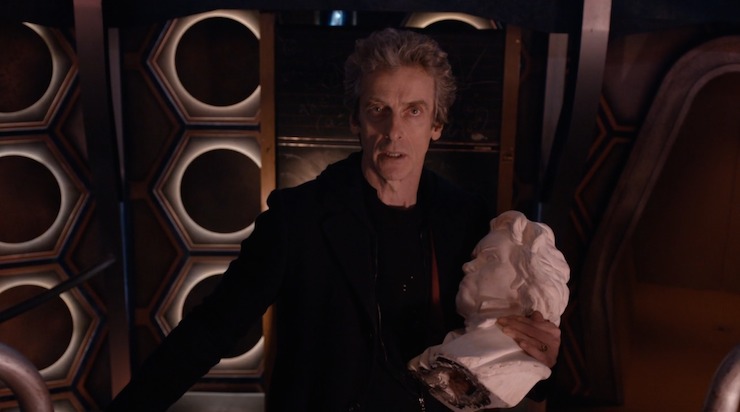
The Doctor arrives with Bennett and O’Donnell in 1980, in the town before it was flooded. It turns out to be an army base where they were doing simulations during the Cold War. They encounter the spaceship and the Tivolian who will later become a ghost—his name is Prentis and he’s an undertaker, carrying the dead Fisher King, a conquerer who controlled his people for some time. (In “The God Complex” we learned the the Tivoli hate conflict so much, they allow anyone to conquer them.) In the future, Cass realizes that the ghost of the Doctor is not saying the same words as the other ghosts; he reciting all of their names in a specific order. The Doctor calls Clara and she tells him about his own ghost, frightening the Doctor. He insists that this is the end, but Clara tells him that he has to change the future to her. He comes to terms with the fact that he will have to die to keep everything moving, and tells Clara and the others to head to the Faraday cage to stay safe. Though he asks he to keep the phone outside (it can’t receive signal in the cage), so she can see if he’s trying to contact her.
Before continuing on, the Doctor tries to get O’Donnell to stay behind on the TARDIS, but she refuses. He and O’Donnell and Bennett find that the Fisher King is alive; he has killed Prentis and engraved the key words on the wall of the spaceship. The trio run from him, but O’Donnell separates herself off and dies. Bennett confronts him about this; the Doctor had figured out that O’Donnell was next because she was next on the list of names his ghost was uttering. The name after O’Donnell’s on the list is Clara, and the Doctor decides that he will try and alter this fixed timeline for Clara’s sake… but the TARDIS just drops them back off at the base at the exact time they arrived. He is unable to leave this point in time. O’Donnell’s ghost appears in the future and takes Clara’s phone away. She realizes that the reason why the ghosts didn’t kill Lunn previously was because Cass never let him go into the spaceship—he didn’t see the coordinates written on the wall, so they’re not stuck in his head, making him a useless ghost as he can’t broadcast the signal. She tells him that he has to go get the phone, a suggestion that appalls Cass. Lunn goes for it anyway, but it turns out to be a trap, and he gets locked in the rec room on the ship. Cass and Clara leave the cage to find him.
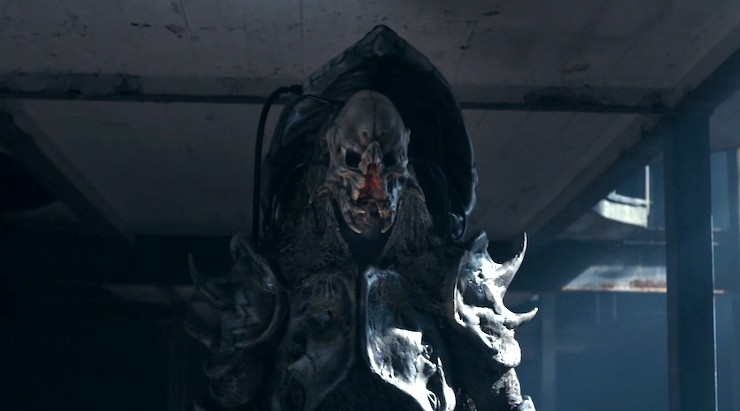
The Doctor decides to confront the Fisher King (after getting Bennett to hide on the TARDIS), in hopes of saving Clara. The Fisher King tells the Doctor that the ghost will eventually multiply and send a signal to his people, that results in an armada on Earth’s doorstep. When the Doctor tries to tell him that Earth is under his protection, the Fisher King is undaunted; he talks of the cowardice of Time Lords, unwilling to change time to suit their own ends until their entry into the Time War. The Doctor tells him that he is worse—though he may alter time, the Fisher King is playing with life and death by using the souls of these people to send his message. He lies and tells the Fisher King that he has erased his writing from the wall of the ship. When the King goes to check on it, he realizes the trick; the missing power cell from the ship (noted in the previous episode) was stolen by the Doctor and is used to blow the dam, killing the Fisher King in the flood. A TARDIS security protocol activates, sending Bennett back to the station in the future.
Cass and Clara get separated, and Moran’s ghost nearly kills Cass, but she discovers him by feeling out a vibration in the floor from the ax he is dragging. She and Clara regroup and locate Lunn in the base hangar. The status chamber opens, and the Doctor clambers out. It turns out that his “ghost” (all the ghosts are electromagnetic creations) was merely a hologram that he controlled via the sonic sunglasses. The other ghosts follow his own into the Faraday cage and are sealed in. The Doctor tells UNIT to cut out the Faraday cage and put it in space. Bennett, seeing O’Donnell’s ghost in the cage, tells Lunn to admit that he loves Cass, now understanding that life is too short. After leaving the base behind, the Doctor explains that his “list of the dead” given by his ghost was made up, and that he put Clara’s name after O’Donnell’s to spur himself into action. When Clara asks how he knew what to say as a ghost, he tells her that he knew because she told him what his ghost was saying in the future—creating a bootstrap paradox.
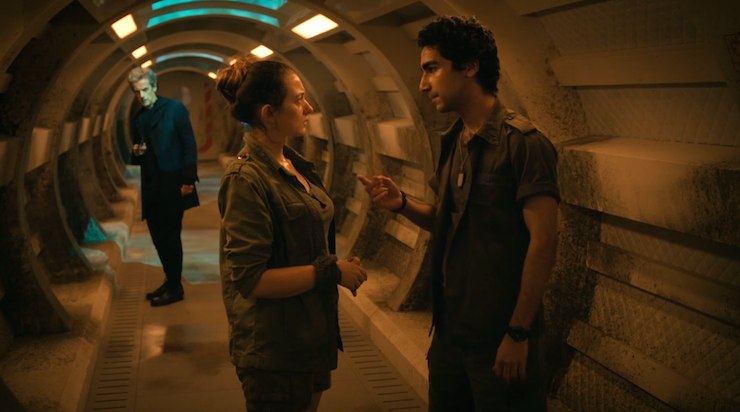
Commentary
I’ll start with the bad, since there’s not much of it; this is a very busy plot that takes a certain amount of mental gymnastics to power through. It’s a complicated mystery, and while I don’t think that’s a bad thing in television (most mysteries on TV could use a little extra thought), it’s not something that we’re accustomed to in the medium. In fact, I’d argue that it probably plays better when you watch the first part directly before it. In addition, the love stories between members of the crew (O’Donnell and Bennett, Cass and Lunn) feel a bit tacked on, as we saw very little chemistry in the first episode, mostly due to the constant peril therein. I can’t say I’m sad over it, however, as the eventual admission from Lunn that he loves Cass was a beautiful piece of the story, played to perfection by Zaqi Ismail and Sophie Stone.
Outside of that, there’s so much to praise in this episode. Though it breaks from the traditional narrative scheme, I thought that the choice to start the episode with the Doctor explaining the bootstrap paradox to us, the viewer, was inspired. I probably enjoyed it moreso because it’s one of my personal favorite time travel paradoxes, and one that the show doesn’t really engage with that often, particularly not by name. Getting more electric guitar from Peter Capaldi is always a plus—that’s him playing during the theme as well, which has got to be a first for any Doctor. (Did you notice that the amp he plugs into reads “Magpie,” the very same purveyor of televisions in “The Idiot’s Lantern”?)
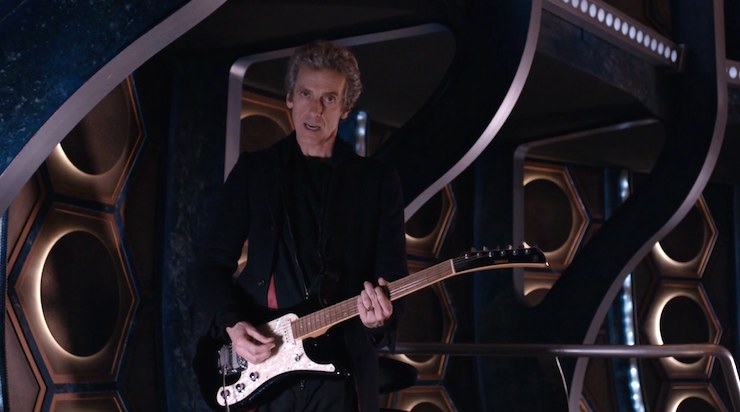
O’Donnell is adorable (even if her death was weak on logic—she just sort of veers off in the wrong direction and gets stabbed?) throughout her part in the episode, from her aside over the TARDIS’ interior to her encyclopedic knowledge of the important Doctor-related events of the past. She would have made an excellent companion—it’s probably fandom blasphemy at this point, but I’d say I prefer her to Osgood. As her mention of “the War Minister” is the one thing in her list that neither we nor the Doctor have heard of, it’s pretty certain that the season finale will involve that mysterious figure. It’s a smart tease in that it’s pointed, but not drawn out or oversold.
Having seen the Tivoli twice now on Who, I’d really love to have a episode centered around their species; their mode of survival is such a stark juxtaposition to the Doctor’s way of life. The Fisher King was also an intriguing villain, properly ominous, with enough left unsaid that his people could be expanded upon in the future. What made him more frightening was his extensive knowledge; we never find out how he knew that the Doctor was a Time Lord, or why he knows so much about the Doctor’s people in general, but everything he said about them was true. Also, he looked terrifying. Probably the scariest character design we’ve had since the Silents.
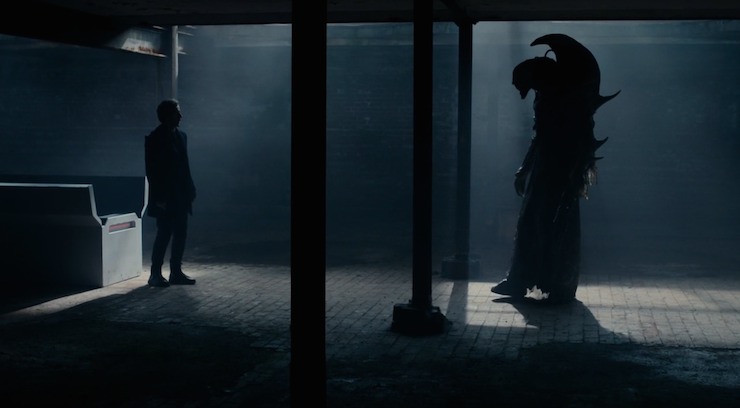
The resolution of the mystery was more enjoyable for the fact that it didn’t “cheat” much anywhere. There are good solid reasons for most of the impossible elements, and we don’t feel robbed of the fear brought about by the ghosts, even when we learn that they are electromagnetic projections—because they still are ghosts after a fashion. It’s the whole reason why the Doctor becomes so indignant on their behalf; the Fisher King is using their souls for his own gain. The explanation of why Lunn wasn’t targeted also works well within the plot, with the explanation that the words must be seen to be effective.
Cass continued to be a star character through and through, and I hope we have some occasion to encounter her again in the series. The fact that she is a character with a disability played by an actress with that same disability is so important, a template for how every television show can and should be doing the same thing. (The actor who plays Lunn has stated in an interview that he has a deaf sister, so he knew BSL before going into the role, which is likely what made their dynamic so natural onscreen.) And it’s not just seeing her there in a role of prominence and power, it’s also the fact that her disability does not get her killed, when the episode could have easily taken that cheap turn. Cass is approached by an enemy she cannot hear, but like many people in her position, she has learned to rely on other senses to guide her. She feels the ghost approach through vibrations in the floor and is allowed to save herself, rather than having Clara comes to the rescue—a more common occurrence in the Who narrative.
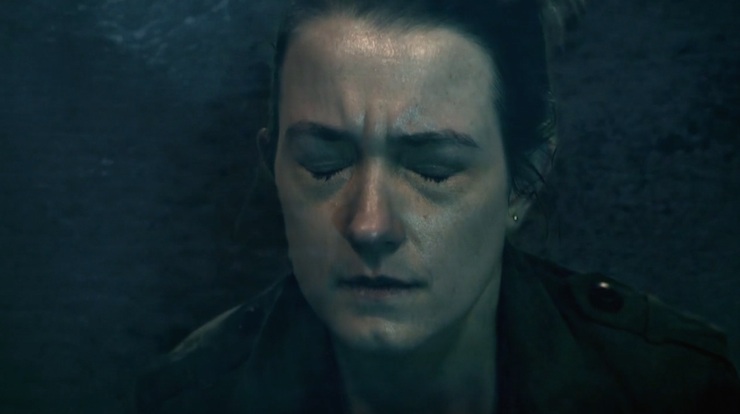
And at the heart of the episode, we have the relationship between the Doctor and Clara, still growing and changing and getting stronger by the day. But we also see the ways in which Clara’s dependency on the Doctor is already becoming a problem, made sharper for the fact that most companions go through this without coming out and saying so the way she does. Clara tells the Doctor that he’s not allowed to die while she’s his traveling buddy, that he’s given her something special, something that helps to refocus her life and make it worth living. It makes the Doctor’s warnings that everyone has to learn to face death much more ominous.
I haven’t been listing the Whovian Easter Eggs in this season thus far, but this episode had a bunch of fun ones:
- Prentis mentions that his race were conquered by the Arcateenians, who were previously mentioned a Whithouse Torchwood episode, “Greeks Bearing Gifts.”
- The aforementioned Magpie amp.
- O’Donnell mentions Harold Saxon, and companions Rose, Martha, and Amy.
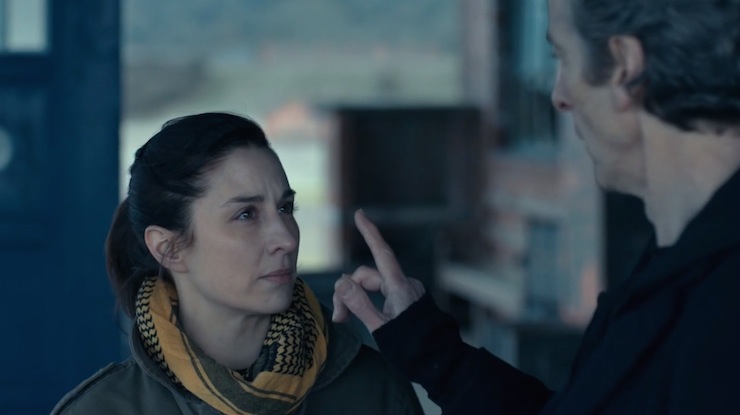
- TARDIS security protocol 712 has been used in “Blink,” and we have seen other emergency protocols in “Let’s Kill Hitler” and “The Parting of the Ways.”
- When O’Donnell asks what year they’re in, the Doctor determines this by licking his finger to better feel the wind with it, which he also did to the determine the section of the Library he and Donna landed in during “Silence in the Library” and to figure out how far away the flight deck was in “Flesh and Stone.”
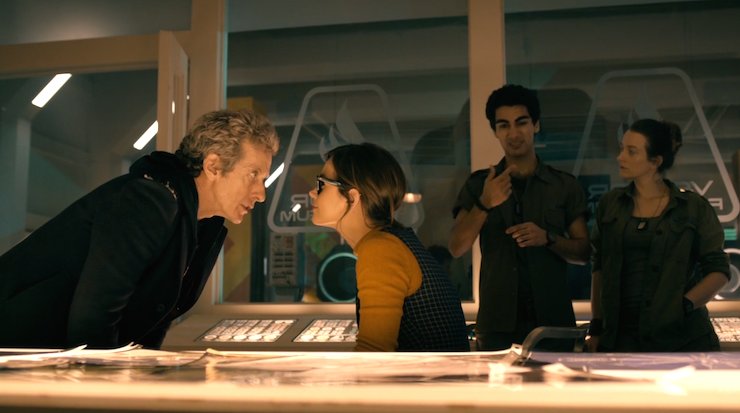
Next week: “The Girl Who Died”










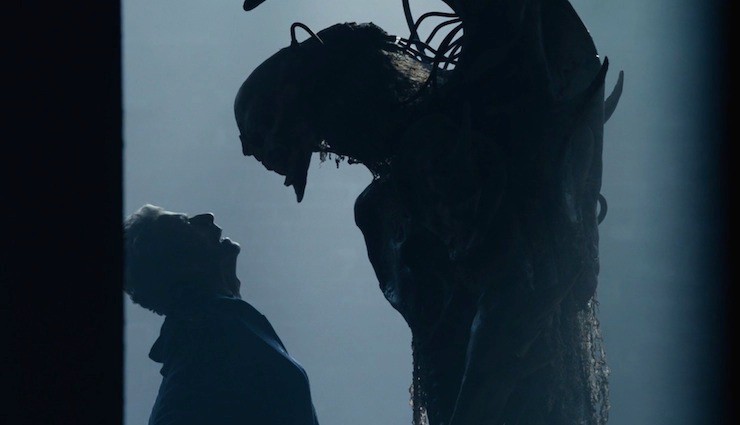
I hope the Minister of War just never shows up. I love when the show references adventures like that. (I mean, they eventually revealed the whole Queen Elizabeth thing, but it took YEARS.)
Also, The Doctor is breaking the fourth wall at the beginning, like he did in Listen.
Technically, what happens in “Time Crash” is also a bootstrap paradox, where Ten knows how to fix the TARDIS because he remembers from when he was Five how he saw himself fixing the TARDIS.
I must say, I’m really enjoying these two-part episodes, because it gives the story time to breathe. I’d gladly sacrifice half the number of stories we get each year if it means the remaining half are twice as interesting.
I didn’t enjoy this two-parter much. It had nice bits, like the deaf actress playing a deaf character, and more guitar playing by Capaldi (I bet it’s in his contract, at his insistence), but it wasn’t enough to make it a good episode(s) for me. Let’s see what the cyborg Vikings next week bring.
I disagree, @1. Really long mysteries can be a lot of fun, but there’s too much stuff in this episode that seems to hang together, and need explaining, for a years-long gambit to work. The Minister of War isn’t the only hinky thing about this whole setup. Am I the only person who actually found the mock village even creepier than the Fisher King? And was it ever actually stated to be a Cold War training staging area? Because. . .it doesn’t make a lot of sense as one. Why bother decking an army training camp with quite so many banners and signs? Why create domestic scenes complete with mannequins? Those don’t seem very functional for doing, say, a civilian-casualty-minimizing exercise. You can’t tell the mannequins to get down on the floor. And if it’s a Cold War setup, why put so much money into building an Orthodox church in the middle of the village? That might make sense if it’s meant to be a Russian village as opposed to an alternate-history setting where the Russians have invaded Scotland (the real-world Soviets don’t seem likely to have built such a large church in a colony town). But at any rate, it’s still overkill for a simple military installation–why bother with details like multiple Orthodox crosses that don’t make a strategic difference if you have to storm the building?
Between this and the Minister of War, I can’t help wonder if we’ve veered into alternate history and that there’s a lot more to be revealed. Any Tor.com readers who can read Russian who want to help translate the signage?
“Blink” as well as “Time” and “Space” are bootstraps, too. I figured the solution was that the Time Vortex was sorting things out, making sure the right information appeared in order to prevent a paradox. I like that they confronted this issue directly.
I’ll second the approval of the two part episodes. This story would have been a mess if they’d tried to cram it into an hour.
ETA: @@.-@ I think it was explicitly stated. I was confused by the Cyrillic signs until it was pointed out.
I’d bet the Minister of War is the Master again.
I loved this episode, and it’s always great to include more diverse characters (Cass reminded me of Marlee Matlin, in a good way), but even if I liked the way she used her other senses to compensate for her disability, I think the scene felt a tiny bit forced: why did she walk for so long in an area filled with enemy ghosts without looking back over her shoulder for a quick peek? The vibration-sensing scene would’ve worked perfectly in a dark room, for instance.
But all in all she had a great performance, and I hope we get to see her again.
@4/mutantalbinocrocodile: I think the idea behind the training area was that it was for sleeper agents, not soldiers. It’s an idea that’s been featured in other shows from Mission: Impossible to Alias — Soviet spies would train in “America Towns” that replicated American communities in great detail, so they could learn to pass as convincing Americans for long-term infiltration missions. So I figured this was the reverse, a facility for training British spies to infiltrate the USSR.
I liked this two-parter a great deal. I’d certainly be in favor of even more two-parters going forward as long as their plots justify their lengths — a problem I sometimes have with Classic Who is that the episodes seem to include a lot of filler because they’re perhaps stretched out. (Most prominently with how sometimes the Doctor and his companions would be captured, freed/escapes, and recaptured over the course of a single serial.)
I’m on the fence regarding whether or not the War Minister is meant to be setup for a future episode, or just a reference to a never-to-be-seen adventure, like “Jim the Fish.” If it is setup, I applaud its subtlety.
I also really liked O’Donnell and would have been quite happy if she’d joined on as a companion. :(
-Andy
@8/AndyHolman: We’ve got at least two more 2-parters coming up this season, according to the released synopses (mildly spoilery). “The Girl Who Died” and “The Woman Who Lived” sound like they should be a 2-parter, but they’re by different writers (same director, though) and they aren’t listed as a 2-parter like the others.
And I didn’t think the War Minister bit was subtle at all. The Doctor blatantly said “I expect I’ll find out soon enough,” which is just one step short of breaking the fourth wall and announcing to the audience that it’s going to be featured later in the season. (Although the fourth wall was already pretty thoroughly demolished in the teaser.)
I’m not sure I like the idea of a Doctor fangirl like O’Donnell or Osgood being a companion. The Doctor needs companions who can challenge and balance him, not just dote on his every word and action. He needs friends, not groupies. And any rabid fan who came along in the TARDIS, thinking they knew what to expect, would probably be in for a very rude awakening.
@9: I agree that the War Minister bit was NOT subtle at all. Subtle would have been the Doctor not asking about it, and fans wondering if they were forgetting a villain (??) and then it being confirmed on the internet that that was not a reference to any previous story.
I loved part 1; it was a nice throwback to all the base under siege episodes that I have a fondness for (without dragging out too much like a lot of those serials tended to do.) I was disappointed by part 2; I was hoping a 80s era military base setting would create a 80s era earth-bound/unit type adventure, but no luck there. Then I felt there was too little plot. It felt very naval-gazing and trying to induce horror at the Doctor’s death which we all knew was not going to happen. There was just something missing in the abandoned town part of the story.
I really thought the ghosts had written the code on the table just under the phone, so that Lunn has to see it when he takes the device, making him another candidate to slaughter. Missed opportunity there.
During the entire episode, I thought the bootstrap paradox was going to be the Doctor writing the coordinates on the spaceship, and I was wondering how that would happen: how could he do something that he knows that will cost lives, just because destiny says so? I thought the introduction was a clever red herring for that reason. By the way, because of the theme of the bootstrap paradox in this episode, O’Donnell’s death didn’t have to make sense (which is precisely why this paradox shouldn’t be overused).
Also, I can’t believe I didn’t think of the possibility of communicating through time by phone, and that the Doctor’s ghost could be a hologram, considering that trick had been used in the first part. I like it when an episode fools me in a way that makes complete sense.
Lots of aliens know of the Time Lords. What made the Fisher King interesting is that he knows who the Doctor is, and he just doesn’t care.
I liked this two-parter better than the season-opening pair of shows. I very much liked O’Donnell, and was disappointed that she had to die. The ghosts were explained in a relatively satisfactory way, which still leaves the Doctor looking forward to his first encounter with real ghosts. I was surprised that it was the Doctor himself who submerged the city. I didn’t see the resolution coming, which I should have, since the ‘speaking to the camera’ speech about bootstrap paradoxes tipped the author’s hand pretty heavily.
The first shows of this season have been pretty grim, so I am looking forward to next week’s robot Vikings. Somehow, that scenario does not sound like one that can be taken too seriously…
For those concerned about the “Russian village”, there is a real East German village, complete with church, on the moors above Sennybridge in Mid Wales, which has been used for training purposes for the British Army for years.
I wasn’t that happy with how the episode resolved… but still fun. I guess I can’t get over the submerged village/undersea base… it just doesn’t make sense to me. You dam up a river to make a lake… the underwater village would have been on the other side of the dam, in the lake part. breaking the dam would wipe out the village… true, but it would just restore the river not submerge the whole village… no way. Definitely not enough water after the dam breaks to have a whole sea base there. If they were drilling for oil… why was a sea base necessary? (cough, oil rig, cough).
Plus, the episode kind of squiggled around a bigger issue… I always think of the Doctor as atheist yet here we have souls being around after death… + some unknowable/inconceivable something guiding the doctor’s actions to create the bootstrap paradoxes. The question of who first wrote Beethoven’s 5th would be a very intriguing mystery/question to the Doctor and I think he would be a little obsessed with finding out the answer.
If they knew the ghosts were electromagnetic and could interact with metal.. why didn’t they try to fight them with electromagnets?
Glad the Doctor called out Clara for going native…
@14 I think part of being a Time Lord is being able to navigate bootstrap paradoxes reasonably safely. There’s been hints in New Who that the Doctor can perceive things on a different scale than mere humans. Who wrote Beethoven’s 5th would not be a mystery to him.
After last week being the most Classic Who New Who has ever been, this felt like trying to pack that with every New Who element it could, positive or negative: angst, pasted-on romance, mortality issues, and a moderately complex bit of time-travel paradox play. I admired how well it all fit together but kind of wished it could have had something uniquely its own to add there.
Also, the Beethoven bit felt to me like a charmingly sneaky Dirk Gently’s Holistic Detective Agency allusion.
The flaw with the ‘Soviet’ village, was that Soviet Communism was explicitly atheist, so that by the mid 1970’s there was only a few thousand Orthodox churches left in the entire USSR, so the ‘temple’ wouldn’t have been much use for training.
@13 I’ve been to Sennybridge a few times, bloody awful place, always raining.
@16 Dirk Gently’s Holistic Detective Agency was based on two scripts that Douglas Adams wrote for Dr Who, City of Death and the unreleased Shada, so it was already it’s own homage, which I think is appropriately paradoxical.
Did you notice, perched on the Magpie Electronics amp, the clockwork squirrel Clara mentioned in the previous episode?
The Doctor’s Daughter was also a bootstrap paradox. The TARDIS was drawn there because there was another Time Lord, which was only made possible because the TARDIS went there.
This two part episode turned out quite well, given that it was clearly conceived as a “cool” audio sensory contrast to episodes which rely on sight and invisibility to create horror – an idea which necessitated a deaf character, who essentially laid out the remaining plot parameters through her existence (along with the basic plot of the original Alien film (the baddie even looked Giger-esque – a poor man’s xenomorph), and a loose interpretation of the Fisher King mythos). I get the feeling that the bootstrap paradox was a purely incidental product of writing a somewhat disjointed story, and that the 4th wall breaking flair was tacked on to make it seem cool and intentional. I found The Doctor’s scolding against changing timelines to be trite and overwrought (I rolled my eyes). Clara and company were simply running through corridors with no effect on the plot (The Doctor and company were too), which leads me to imagine that this two parter could have worked better as a very lean one part episode. If the first half was a promising call back to classic Who story structure, the second half was empty by comparison, and was a call back to classic Who shortcomings, but, it was entertaining, and maintained a thrilling undertone of dread. C+. I envision Moffat giving a spiel to each writer, stating that the new Sonic Sunglasses (which are gimmicky but not overly so) must be incorporated in their plots. Haven’t seen any character development yet this season.
I thought “Blink” was a much better example of the bootstrap paradox, and the breaking of the fourth wall ruined the entire episode for me. There’s no reason they couldn’t work it into dialogue (in fact they did that too, which proves my point).
I liked part 1 originally, but now they’re both UGH to me.
@21/gomiller: I think the fourth-wall-breaking monologues are an interesting stylistic touch for the Capaldi era. It’s got kind of a retro feel, like Rod Serling or Alfred Hitchcock talking to the audience to introduce the story. Or, to get even more retro, it’s like a Shakespearean prologue with a character addressing the audience about the play to follow — very theatrical.
In-universe, maybe the teaser was actually showing what the Doctor said to Clara after the closing scene of the episode, as seen through Clara’s eyes. Albeit in a stylized way,since there’s no way Clara would stay quiet for that length of time…
One major problem with a time traveler being responsible for Beethoven’s work is that it is at odds with the historical fact that Beethoven at first dedicated his third symphony to Napoleon, but when Napoleon declared himself emperor Beethoven became angry and erased the dedication with such force that he made holes in the manuscript. A time traveler would have known Napoleon’s history in advance and not made that dedication in the first place. I’m hoping Moffat didn’t really intend to imply that Beethoven may not have really existed, and that this was just an entertaining example.
@23: Beethoven is used as an example, the Doctor even says that he met him.
I hated this episode. The bootstrap paradox is what it says on the tin, a paradox, and if it doesn’t have an explanation then the Doctor would not be able to do it, he is supposed to be the master of reason and scientific knowledge isn’t he ? The writers could have easily explained the solution to the ghosts in a more logical way that would have given the viewer a final piece to this 2 part bonanza not leave us with some dumb paradox as the answer.
Also what annoyed me was that when the Fisher King meets the doctor why didn’t he just beat him up and kill him like he did with everyone else ? Its not like the Doctor could have done anything he is twice his size, and no explanation for the Fisher Kings sudden show of compassion is given …
In short if you’re gonna drag out a story into 2 episodes, then at least make the end worth the wait !!!
Disgruntled Doctor Who Fan who wants to go back in time and tear up the script in some anti-paradoxical paradox … so there !!!
If a Timelord cannot square away a paradox, then who can? Didn’t they use targeted paradox weapons in the Time War? And sealed them again?
@25/Wiley: Actually a self-consistent causal loop where something goes back in time and causes itself to happen is not a paradox from a physical or mathematical standpoint. As long as the interaction is consistent, it’s physically valid. This is called the Novikov Self-Consistency Principle and it’s a core idea in modern theoretical physics about time travel and causality. It’s only a paradox in a philosophical or epistemological sense: Where did the knowledge, the ideas, come from? We don’t like the idea that something with meaning could’ve just sprung into existence accidentally through a quirk of particle interactions. We think of meaning as a substance that has to come from somewhere. And that’s why we see it as a paradox. But physics doesn’t care about knowledge or ideas or meaning. It’s just particles and energy fields interacting. If a pattern recursively generates itself, that’s physically fine as long as the process is mathematically self-consistent.
@27 / ChristopherLBennett
I am more than happy to accept a mathematical / scientific paradox and more than happy for time war time lords to use paradoxical weapons (re : Random22’s comment) but in this case the paradox had a starting point which negates the concept of a paradox.
Jenna begs the Doctor to break the time-lord code after she reads her name as next on the list, but in reality the list itself was made up from the past i.e. she was never a target therefore there is no cause for the Doctor to have created the paradox in the first place i.e. the Doctor created an unnecessary paradox. Its the same as going back in time writing a note saying that someone has burned Beethoven’s works and then going back in time to give it to him and writing a note saying that someone had burned it … what’s the point in that ??? so the Doctor broke the time lord code for nothing.
Secondly the paradox in a mathematical paradox has a consistent interaction as you say but in this case the Doctor in the future would already know that he himself sent the message to himself ending the paradox … as you say the interaction would become inconsistent … bottom line physics doesn’t care about the knowledge or the idea, but given that we are not particles or electrons we have choice and human actions are dependant on the idea and the knowledge and therefore you cannot create a bootstrap paradox when knowing the paradox by definition will change your choice ending the paradox … which is the case here.
@28/Wiley: Everyone there was a target, including Clara. The only thing the Doctor fibbed about was that Clara would be the immediately next victim. He didn’t know what order they’d be killed in, but he knew the Fisher King would try to kill everyone who’d seen the writing, and Clara did see the writing. So yes, Clara would have died if the Doctor hadn’t acted. She just might not have died in the order he claimed.
And you’re wrong — the interaction is entirely consistent. The Doctor’s actions in the future led to his actions in the (subjective) past which led to his actions in the future. He went back in time because the message he’d arranged to send himself prompted him to go back in time so that he’d take the actions that led to him sending that message. It’s completely consistent, because it causes itself. A paradox is something that contradicts itself.
I liked these episodes and everything with the crew on the base, but why did the Fisher King come to Earth in the first place, to conquer and colonize it? By himself? The only reason the figures were scrawled on the wall was because he was stranded there, and hoping to send a signal for reinforcements…. right?
Did he arrive in a suspended animation chamber, or dead in a coffin? Why was the undertaker character necessary and did he arrive in the same ship?
I also don’t understand the relevance of the Fisher King name. How was he knight-like? The Arthurian legend is the wounded keeper of the Holy Grail.
What am I missing?